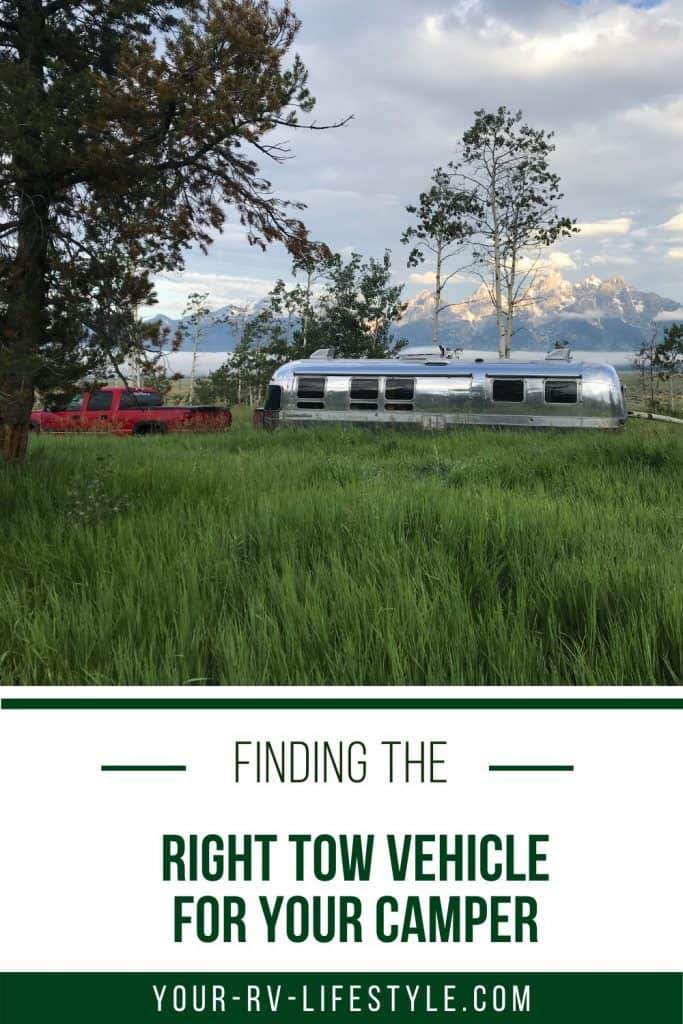If you’ve set your sights on full or part-time RVing in a travel trailer, you’ll face the inevitable question: how much can my truck tow?
Or, if you don’t have a towing capable vehicle, you’ll instead be asking — how can I find the right tow vehicle for the camper I want to get?
These age old questions involve a list of options and variables that can seem so complicated that even RV and truck dealers don’t always know how much their vehicles can tow!
My wife and I have been full-time RVing with an 8,500 pound Airstream for 4+ years now, but we started out totally green.
Didn’t know the first thing about towing.
Had to figure it all out on our own.
And thankfully — we figured out exactly how much we needed to tow, how to find the right tow vehicle for our camper, and all the other variables that matter for full-time trailer towing.
I’ll be sharing all of that with you in this article. I plan to take this seemingly confusing topic and make sense of it for you as you figure out how much your car can tow or how to find the right tow vehicle for the camper you want.
I’ll start by unpacking some key terms, move into the different tow vehicles recommended for different campers, and will wrap with some other important considerations for safely knowing how much your car can safely tow.
Disclaimer: We’re offering general guidelines here. When deciding how much your truck can tow and/or what type of travel trailer to get, be sure to always consult your owner’s manual, RV/car dealerships, and other resources to ensure you’re towing safely.

Is Your Car Equipped to Tow?
Before asking how much your car can tow, you should ask yourself if it’s even equipped to tow anything. You’ve surely seen the commercials advertising a “max tow capacity” of certain vehicles.
But just because a Honda commercial tells you that their CRV has a max tow of 1,500 pounds does not mean that every CRV will tow that much.
Factors like all wheel drive versus two wheel drive, transmission type, and extra accessories all impact the amount that your specific vehicle can tow.
We’ll dig deep into all the factors impacting towability in a moment, but for now, it is important to note that when figuring out how much your car can tow not all makes are created equal.
How Much Can My Truck Tow?
If you have just a passenger car and are wondering how much can my car tow, note that most regular passenger cars will barely be able to tow the tiniest of teardrop campers. But even that can be too much for some cars.
Ultimately, if you have a regular 4-door sedan, the chances are slim that you’ll be able to effectively tow anything — especially if you want your car to tow a camper as a full-time home.
There are, however, some exceptions to this:
- If you have a vehicle like a Subaru Outback, these can sometimes be equipped to tow north of 3,000 pounds — putting you in range for some small travel trailers.
- If you have a crossover SUV (e.g. Ford Escape, Chevy Equinox, Honda CRV, RAV4, etc.) these can also sometimes be equipped to tow around 3,000 pounds.
- Older large passenger sedans can sometimes tow, but you’ll need to check your owners manual for details.
- NOTE: Before you think about using a car to tow, you should consult your owners manual to figure out how much your car can tow to see if it’s even an option to consider.
If you have a larger SUV such as a Ford Explorer, Chevy Traverse, or Toyota Highlander, these will usually tow over 5,000 pounds when equipped with a max tow package.
If you have an SUV that is built on a truck frame (e.g. Chevy Tahoe/Suburban, Toyota 4 Runner, Nissan Armada, etc.) equipped with a max tow package, you’ll likely be able to tow over 8,000 pounds.
When figuring out how much your car can tow, the most important thing is to consult your owners manual to be sure you understand what your exact car was designed to do.
This video will also help you understand some of the key factors impacting towing:
Key Terms For Finding The Right Tow Vehicle For Your Camper
When you start asking “how much can my truck tow?” you’ll quickly come across several terms you might not have heard before.
So, let’s take a quick look at common towing terms so you can find the right tow vehicle for your camper:
- Gross Vehicle Weight Rating (GVWR) – This is the maximum amount of weight your car or truck can handle without a trailer attached. GVWR is set by all manufacturers for the cars they produce and tells you how much weight your car can handle — be it passengers, fuel, added cargo, etc.
- Maximum tow rating – If your vehicle is equipped to tow, it will have a maximum tow rating.
- Gross Combined Weight Rating (GCWR) – This is the maximum weight your vehicle can handle including a trailer.For example, if your truck has a GVWR of 5,000 pounds and a 10,000 pound max tow capacity, your GCWR would be approximately 5,000 (GVWR) + 10,000 (Max Tow Rating) = 15,000 pounds GCWR.

- Dry/Unloaded Trailer Weight – This is a common term that simply tells you the weight of your travel trailer (e.g. trailer+appliances+any fixed furnishings) without anything additional on board (e.g. your stuff, liquids in tanks, etc.).When it comes to figuring out how much your car can tow, you’ll rarely want to rely on your camper’s dry weight because you’ll almost always have something in it while you travel.
- Gross/Loaded Trailer Weight – This is the maximum amount of weight that your travel trailer can handle when it is loaded with your stuff, the tanks are loaded with liquids, etc.NOTE: Water is heavy. Weighing in at around 8lbs., it can add significant weight to your trailer. For example, if your fresh water tank has a 40 gallon capacity, that means a full tank adds 320 pounds to your camper’s weight.
If you’re asking yourself “how much can my truck tow?”, it’s important to compare it to the gross trailer weight of any camper you look at because you’ll rarely be towing an unloaded trailer.
- Axle Ratio – Axle ratio is a measure of the size of the gears in your rear differential (your differential links your rear axle to your driveshaft). The larger your axle ratio the larger your differential.
For example, many standard trucks have a 3:23 axle ratio whereas heavy duty trucks sometimes have ratios of 4:10 or higher. While all motor vehicles have axle ratios, this is mostly important in trucks.
Because much of your towing power comes from your rear axle, a larger differential usually equals more towing power.
Your Transmission Impacts How Much Your Car Can Tow
One of the largest components that impacts how much your car can tow is the type of transmission it has.
Many car makers offer different transmissions on the same make of car depending on the trim level you get.
For example, Chevy Silverados offer a 10 speed transmission in higher end trucks versus a 6 speed transmission in their base models.
Additionally, if you are planning to tow a camper that is above 10,000 pounds, you should consider a heavy duty truck because they come equipped with a heavy duty transmission.
Heavy duty transmissions will generally get you far more longevity out of your truck if you tow heavy loads regularly.
The bottom line is when determining how much your car can tow, you should be asking questions about transmission type because it impacts towability greatly.
Our Chevy has a heavy duty Allison Transmission that gets the job done.
How Much Can My Truck Tow? 2×4 Versus 4×4
All other things being equal, 2×4 trucks will tow more than 4×4 trucks for two reasons:
- 4 Wheel Drive systems add weight and added weight on the truck decreases max tow.
- 4WD systems result in a small amount of relative power loss that translates into lower tow numbers.
That said, there are situations where you will want to have a 4×4 for towing. In these cases, it’s important to make sure your car can tow your camper even with 4×4.

How Much Can My Truck Tow? Dual Wheel Versus Single Rear Wheel
Dual rear wheel trucks (aka Duallys or DRW) will almost always tow significantly more than single rear wheel (aka SRW) trucks.
Duallys will also generally tow more smoothly because of the larger rear end – especially when you’re towing fifth-wheel or gooseneck.
However, Duallys are pesky daily drivers because they are so large. Things like drive thrus, urban driving, and parking garages will all be much more difficult to navigate with a dually than a single rear wheel truck.
Because of this, it is generally only necessary to consider a dually truck when you want to tow over 12,000 pounds. If you plan to use your tow vehicle as your daily driver, you should avoid getting a dually unless you’re purchasing a very large and very long RV (e.g. a fifth-wheel over 42ft. weighing over 14,000 pounds).
How Much Can My Truck Tow? Local Versus National Towing
An important question to ask yourself when determining how much your car can tow is: where do you plan to tow?
While you should never exceed your car’s max towing capacity, if you plan to RV part-time and only travel near your home on relatively flat terrain, you’ll have more flexibility.
If you’re doing periodic local towing, it can be possible to purchase a car that is capable of towing your camper but also great for daily use. In this case, you could purchase a camper whose gross weight is up to 90% of your max tow and likely be okay.
If, on the other hand, you plan to be a full-time RVer and/or travel nationwide over many different terrains, it would be a good idea to have a car/truck with a max tow weight rating that is at least 30% higher than your camper’s loaded (aka gross) weight.
For example, my wife and I tow an Airstream that weighs around 8,500 pounds when fully loaded. We are full-timers and we travel up mountains, through deserts, and all other sorts of terrain. Because of this, we purchased a truck with a 13,500 pound max tow rating to make sure we had wiggle room in any scenario.
My wife and I bought higher tow capacity so we could tow anywhere we wanted.
Diesel or Gas Engine For Towing?
The decision to tow with a diesel or a gas vehicle is a hotly debated topic among RVers.
I’ve been towing an 8,500 pound camper for 4+ years all over the U.S. with a heavy duty Chevy Silverado with a gasoline engine and have never flinched. Personally, I say gas towing is best for almost anyone looking to tow 12,000 pounds or less.
I prefer gas towing because gas engines are much easier (and less costly) to service, gas engines don’t require DEF additive like diesel engines do, and can be very long lasting if you take care of them.
That said, there are certain situations where diesel engines beat out gas engines for towing:
-
- If you’ll be towing over 12,000 pounds full-time, diesel trucks are worth considering – But be aware that diesel trucks will cost around $10,000 more than an otherwise equal gas powered truck.
- If you plan to keep your truck for 300,000 miles plus – Diesel engines are historically more long lasting than gas engines, but be aware that maintenance on them costs more.For example, replacing fuel injectors on some diesel engines can cost over $8,000! That’s why it really pays to do the math and make sure that you’ll be able to come out ahead on costs associated with diesel engines.
- If you plan to keep the truck forever AND run a lot of highway miles – Most full-time RVers will put in a lot of miles on the highway. If you plan to full-time AND keep your truck for the long haul, diesel can make sense because you’ll get significantly better fuel economy – especially on the highway.But be sure to do the math and not get wrapped up in emotion. You’ll be paying $10,000 or more for the privilege of driving a diesel – to come out ahead on fuel economy you have to be doing a lot of driving.

When Finding The Right Tow Vehicle – Camper First or Tow Vehicle First?
A question I frequently hear from folks getting into RVing is — should I pick my camper or my tow vehicle first?
Unless you already have a towing capable vehicle that you want to use, you should always pick out the type of camper you want first and then choose your tow vehicle.
For example, my wife and I knew we wanted a vintage Airstream that was around 30 ft. A bit of research quickly showed us that the gross weight range for these trailers was 7,000-9,000lbs.
We were also planning to RV full-time so we wanted to get a tow vehicle with a max tow rating that was well above the weight we’d be towing.
By starting with the camper and then choosing our tow vehicle, we ensured that we got the best vehicle to create the safest and smoothest towing experience for our needs.
If you’re wondering how much your car can tow, you’ll be faced with a seemingly endless array of options, variables, and factors that can impact the type of camper you can get. By sticking with the above guide for finding the right tow vehicle for your camper, you’ll set yourself up for years of safe and fun camping memories.
Finding the right tow vehicle for your camper leads to unforgettable memories.


Jill Miller is the founder of Your RV Lifestyle. Trading corporate America for the open road, Jill, along with her partner Jose, began their RV journey, making an unconventional start by wintering in New Jersey. A natural adventurer, she was motivated by a desire to explore the USA and beyond, embracing the varied landscapes, communities, and cultures across the country.
For Jill, the allure of RV living was not about material accumulation, but rather the pursuit of an adventurous, fulfilling lifestyle. A lover of golf, bicycling, hiking, and line dancing, she has carried her passions across the country, engaging with them in diverse settings. Jill’s commitment to the RV lifestyle came after years of careful research, numerous consultations with RV owners, and personal trials, including living in a rental RV.



